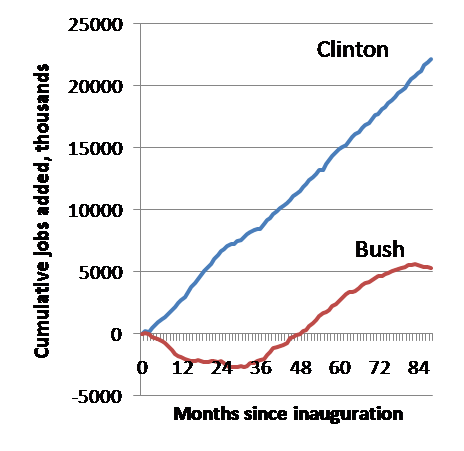
Job creation?
Taxes
 | Required payments of money to governments that are used to provide public goods and services for the benefit of the community as a whole. |
Plan for Restoring Fiscal Discipline
“The cost of our debt is one of the fastest growing expenses in the federal budget. This rising debt is a hidden domestic enemy, robbing our cities and states of critical investments in infrastructure like bridges, ports, and levees; robbing our families and our children of critical investments in education and health care reform; robbing our seniors of the retirement and health security they have counted on. . . . If Washington were serious about honest tax relief in this country, we'd see an effort to reduce our national debt by returning to responsible fiscal policies.”
— Barack Obama, Speech in the U.S. Senate, March 13, 2006
At a Glance
Speak your mind and help set the policies that will guide this campaign and change the country.
The Problem
Increasing Debt: Under President Bush, the federal debt has increased from $5.7 trillion to $8.8 trillion, an increase of more than 50 percent.
Irresponsible Tax Cuts: President Bush's policies of giving tax breaks for the wealthy will cost the nation over $2.3 trillion by the time they expire in 2009.
Barack Obama and Joe Biden's Plan
Restore Fiscal Discipline to Washington
- Reinstate PAYGO Rules: Obama and Biden believe that a critical step in restoring fiscal discipline is enforcing pay-as-you-go (PAYGO) budgeting rules which require new spending commitments or tax changes to be paid for by cuts to other programs or new revenue.
- Reverse Bush Tax Cuts for the Wealthy: Obama and Biden will protect tax cuts for poor and middle class families, but they will reverse most of the Bush tax cuts for the wealthiest taxpayers.
- Cut Pork Barrel Spending: Obama introduced and passed bipartisan legislation that would require more disclosure and transparency for special-interest earmarks. Obama and Biden believe that spending that cannot withstand public scrutiny cannot be justified. Obama and Biden will slash earmarks to no greater than year 2001 levels and ensure all spending decisions are open to the public.
- Make Government Spending More Accountable and Efficient: Obama and Biden will ensure that federal contracts over $25,000 are competitively bid. Obama and Biden will also increase the efficiency of government programs through better use of technology, stronger management that demands accountability and by leveraging the government's high-volume purchasing power to get lower prices.
- End Wasteful Government Spending: Obama and Biden will stop funding wasteful, obsolete federal government programs that make no financial sense. Obama and Biden have called for an end to subsidies for oil and gas companies that are enjoying record profits, as well as the elimination of subsidies to the private student loan industry which has repeatedly used unethical business practices. Obama and Biden will also tackle wasteful spending in the Medicare program.
Make the Tax System More Fair and Efficient
- End Tax Haven Abuse: Building on his bipartisan work in the Senate, Obama will give the Treasury Department the tools it needs to stop the abuse of tax shelters and offshore tax havens and help close the $350 billion tax gap between taxes owed and taxes paid.
- Close Special Interest Corporate Loopholes: Obama and Biden will level the playing field for all businesses by eliminating special-interest loopholes and deductions, such as those for the oil and gas industry.
Barack Obama and Joe Biden's Record
- PAYGO: Obama voted in 2005, 2006, and 2007 to reinstate pay-as-you-go (PAYGO) federal budget rules.
- No-Bid Contracts: Obama has introduced and helped pass bipartisan legislation to limit the abuse of no-bid federal contracts.
- Against Raising the Federal Debt Limit: In 2006, Obama voted against misguided Republican efforts to raise the statutory debt limit at the same time the Republicans were pushing through massive debt-financed tax cuts for the wealthy.
For More Information about Barack's Plan
(Read the party platform "RENEWING AMERICA'S PROMISE"--java)
2008 Presidential Candidates' Tax Proposals
[download this matrix in Excel format or PDF format]TPC's latest analysis of the presidential candidates' tax plans (including effects on representative taxpayers and distributional tables) is available here
Barack Obama | John McCain |
Information is as reported on candidates' websites and public statements. TPC has not verified claims made.
Sources:
Cooper, Michael "McCain Outlines Broad Proposals for U.S. Economy." New York Times. April 16, 2008.
McCain, John "Government Spending, Lower Taxes, and Economic Prosperity."
McCain, John "McCain Tax Cut Plan - Pro-Growth Tax Agenda"
Obama, Barack "Tax Fairness for the Middle Class."
This document will be updated as new information becomes available.
Julianna Koch, June 10, 2008
- How to Find Tables for TPC’s Analysis of the Candidates’ Tax Plans (September 12, 2008)
- An Updated Analysis of the 2008 Presidential Candidates' Tax Plans: Updated September 12, 2008 (September 12, 2008)
- An Updated Analysis of the 2008 Presidential Candidates' Tax Plans: Executive Summary - Revised September 15, 2008 (September 15, 2008)
- Complete set of revenue and distributional tables for candidates' tax plans analysis (August 14, 2008)
- Who Pays Capital Gain Tax? (July 31, 2008)

TAX DAY is coming. For most Americans, it's merely a reminder to get that paperwork done. But for many years, tax day reminded Americans that war means sacrifice.Since Sept. 11, 2001, President Bush has often invoked a spirit of sacrifice and dedication to the greater good. Yet this call to sacrifice has not made it into the administration's economic and tax policies.
In past wars, those who could most afford to pay did so. During World War II, marginal tax rates on the wealthy reached over 90 percent. During wars in Korea and Vietnam, and throughout the Cold War, the most fortunate among us contributed almost as heavily to the national effort, paying at marginal rates of over 50 percent. Economic sacrifices were shared.
But now the Bush White House insists that those making $300,000 and up -- already paying the lowest tax rates in 50 years -- needn't bother to pay a penny more toward national needs. This, despite stepped-up national security needs, active wars in both Afghanistan and Iraq, and the devastation of Hurricane Katrina.
In fact, since top tax rates were cut to 35 percent in 2003, millions of fortunate families, including our family, now pay many thousands of dollars less per year in taxes than we did before Sept. 11. Where's the sacrifice in that? (You can estimate your own savings using the Responsible Wealth online tax cut calculator at responsiblewealth.org.)
Those fighting and dying in Iraq -- and their families -- are already sacrificing daily for all of us. Many have given their lives or their health in this war, but that's not the only sacrifice these families are making.
It is no secret that families in military service are overwhelmingly of modest means, many barely getting by economically. Most military families have benefited only marginally from the tax cuts, while the sons and daughters of those who consistently reap the most economically from our system are, by and large, absent from the field of battle. It was once a truism that some fight, some pay. Yet because of our president's policies, the same Americans end up fighting and paying, while most well-off families do neither.
This is not just shockingly unfair; it is unsustainable for a democracy. If the well off don't pay their share, the burden falls on everyone else. A voluntary option is available: Well-off taxpayers can easily estimate their Clinton- and Bush-era tax cuts and redirect those savings with a donation targeted to efforts to help fix the problem. But given the massive scale of the shortfall, this will only go so far.
For six years, we have seen the erosion of service after service relied on by the average American. Schools are gasping for resources; infrastructure is crumbling; losses in benefits for the poorest and most vulnerable have been dire. Borrowing to cover essential spending is up as well.
The result is mounting national debt on top of rising personal debt. The current approach burdens not just this generation, but also everyone in the next generation. Yet once again, it is those of modest means who will experience the greatest suffering.
As we debate the course of the Iraq war on the eve of tax day, it is time for a different approach -- one based on returning to shared sacrifice. If we do not plan to draft soldiers regardless of their economic class, then at the very least every American should bear his or her fair share of the economic burden.
Let's bring back a 40 percent marginal tax rate on high incomes (over $500,000, perhaps) until this war is over. If the burden is borne broadly and fairly, the wealthiest Americans will have a powerful incentive to consider whether the costs of war outweigh its benefits. Only then will all of us have a personal stake in the discussion of how and when our exit from Iraq should proceed.
David Abromowitz and Joan Ruttenberg are lawyers and members of the group Responsible Wealth [1].
© Copyright 2007 The Boston Globe
Article printed from www.CommonDreams.org




No comments:
Post a Comment